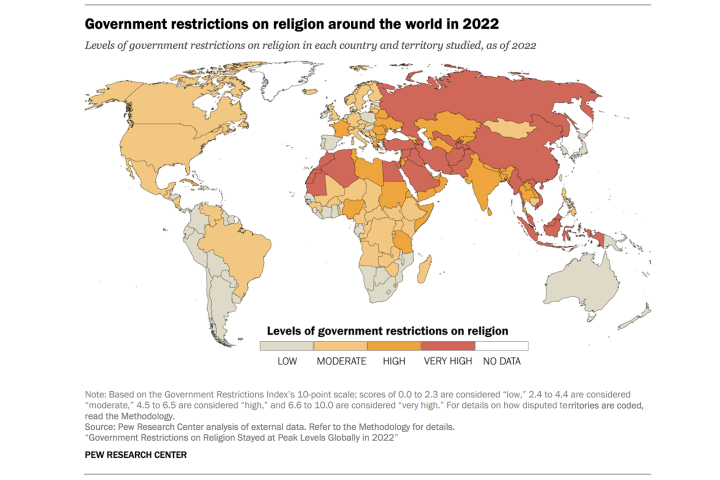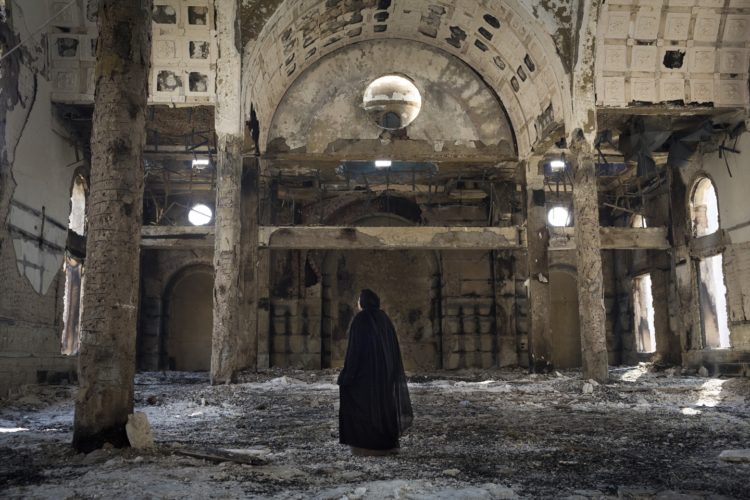The Pew Research Center has unveiled its 15th annual Global Restrictions on Religion report, shedding light on significant challenges to religious freedom worldwide.
The findings emphasize the plight of religious minorities in countries like Egypt, Syria, Pakistan, and Iraq, where both government-imposed limitations and societal hostility converge to create severe hardships for those practicing their faith.
A key takeaway from the report is the interplay between government restrictions and societal hostilities. Researchers utilized two indices—the Government Restrictions Index (GRI) and the Social Hostilities Index (SHI)—to evaluate the state of religious freedom in 198 nations. The GRI measures 20 types of governmental controls, such as bans on specific religious practices, limits on conversions, and preferential treatment of certain religions. Meanwhile, the SHI assesses 13 types of societal hostilities, including mob violence, hate crimes, and other forms of discrimination against religious groups.
📣 New Christian Talk Podcast!
“Mark 9: Jesus Transfigures, Drives Out Demons
Countries such as Egypt, Syria, Pakistan, and Iraq scored alarmingly high on both indices, indicating some of the harshest environments for religious minorities. The report shows that 24 nations recorded GRI scores of 4.5 or above on a 10-point scale, with SHI scores surpassing 3.6. Iraq, in particular, saw a spike in societal hostility due to increased violence by militia groups targeting minority religions. Additionally, Amnesty International’s 2024 report highlighted cases of violence against women who converted from one faith to another in Iraq’s Kurdistan region.
Other countries, including India, Israel, and Nigeria, also face significant religious tensions. Nigeria, in particular, is grappling with high societal hostility driven by ongoing violence from groups like Boko Haram and the Islamic State’s West Africa Province. These challenges exacerbate the already fragile conditions for religious communities in the region.
The report distinguishes between authoritarian regimes and democracies when assessing restrictions. Countries like China and Cuba, while scoring high on government restrictions, showed relatively lower societal hostilities. These findings reflect the authoritarian nature of these regimes, where religious controls often serve as an extension of broader civil liberties restrictions. For instance, China’s policies in Tibet have led to the displacement of approximately 26,000 individuals, demonstrating how authoritarian governance can suppress religious expression.
Globally, the report highlights a troubling rise in violence and harassment against religious groups. In 2022, 145 countries reported incidents of harassment, up from 137 in 2021. These incidents range from expulsions and physical attacks to the destruction of property. Specific examples include gang violence targeting religious groups in Haiti and intensified persecution of faith-based communities in China.
The comprehensive analysis underscores that these challenges are not confined to a single region or political system. Religious freedom remains under threat in various forms, whether through government mandates, societal hostility, or violent incidents. The findings call for a nuanced approach to addressing these issues, recognizing the diverse factors contributing to the erosion of religious liberties.
The report also sheds light on the resilience of religious minorities in the face of adversity. Despite facing significant risks, many communities continue to practice their faith and advocate for their rights. This resilience highlights the importance of global advocacy and international cooperation in defending religious freedom.
In addition to authoritarian regimes, democracies are not immune to religious freedom challenges. Countries like India and Israel, often regarded as democratic nations, face persistent religious tensions that undermine their democratic ideals. In India, for instance, religious minorities have reported increased discrimination and violence, often tied to political and social dynamics.
The Pew report emphasizes the role of civil society and international organizations in mitigating these challenges. Advocacy efforts, interfaith dialogues, and policy interventions are crucial in promoting tolerance and understanding across different religious communities. However, these efforts often face resistance from entrenched societal and governmental structures.
One of the most pressing concerns highlighted in the report is the increasing use of violence as a tool to suppress religious expression. From targeted killings to mob attacks, these violent acts not only harm individuals but also destabilize entire communities. The international community has a critical role to play in addressing these injustices.
Education and awareness are also essential components of fostering religious tolerance. The report suggests that initiatives aimed at educating the public about religious diversity can help reduce societal hostility and build more inclusive communities. Such efforts require sustained commitment from both governments and non-governmental organizations.
The report’s findings call for a multifaceted approach to addressing religious freedom challenges. Governments, civil society, and international actors must collaborate to create environments where religious expression is protected and respected. This involves not only addressing immediate threats but also tackling the underlying factors contributing to religious discrimination and violence.
Ultimately, the Pew Research Center’s report serves as a sobering reminder of the ongoing struggles for religious freedom worldwide. While progress has been made in some areas, significant work remains to ensure that individuals can practice their faith without fear of persecution or hostility. The global community must prioritize these efforts to uphold the fundamental right to religious freedom
